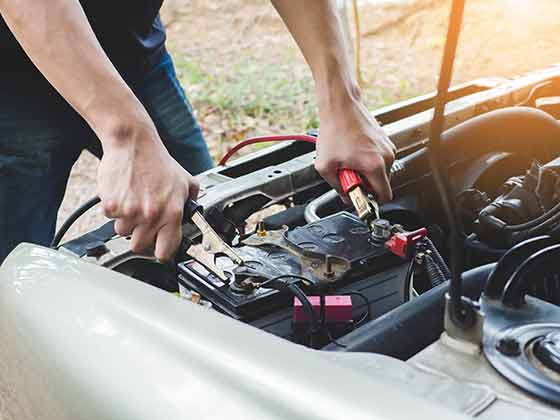Batteries explained as simple as I know how, I understand there will be a lot of information left out, but today I would like to cover most of the basics. Most “car” batteries have lead plates that are surrounded by an acid-water mixture and as this mixture comes in contact with the lead, the lead dissolves producing electricity.
Jumping off or charging a battery, should be done in a well-ventilated area. Connect the positive jumper or charger lead to the positive battery post or lug (this is a terminal that is easy to get to). Connect the negative lead to a solid ground like the engine block or on some vehicles there is a lug just for this.
After the connections are made, let the battery charge for at least 10 minutes, more if the battery is really low before trying to start. If jumping from another vehicle, let the engine run with all accessories turned off so more charge will be delivered to the weak battery.
Explosions happen when a battery is overheated or is sulfating. Usually, the battery will have sulfur, (rotten egg smell), and all that is needed is a little spark like when starting, charging or jumping off, to cause an explosion.
If that smell is noticed DO NOT JUMP OR CHARGE!! You could provide the spark to cause an explosion.
Sulfating occurs when a battery is overheated or is sulfating. This usually happens when batteries reach the end of their lives, the lead plates become thin and overheat, this boils the acid/water mixture creating hydrogen gas just add a little spark and BOOM!! The battery blows up.
Why does the radio play and the engine will not start? Think of it this way, it takes only a little bit of energy to run a radio but a lot to run the engine’s starter. A good example is filling a drinking glass with water compared to filling a swimming pool, it just takes a lot more.
Battery service, most of today’s batteries are service free, the case is sealed and the only thing that can be done is a visual inspection or replacement.
Visual inspection, what to look for, leakage from the case, corrosion or leakage around battery cable connections or sides of the case are bulged out. The life span of a battery, this is an impossible thing to predict because there are so many factors. I have seen batteries last over 7 years and I have seen some fail within a year. I have listed some of the variables that have an impact on the life span of batteries.
1. How thick the lead is in the cell plates, the thicker the lead the longer it takes to dissolve. Higher quality batteries such as AC Delco batteries have more lead than economy batteries, think of it like this lead cost money how good of a battery do you want?
2. Batteries that are not used very often usually have a shorter life span, batteries do better if they are used a least 30 minutes a day. That is why marine batteries do not last very long, they are not used very often.
3. Servicing batteries, if a lead acid battery needs to have water added to it use only distilled or dematerialized water, tap water has minerals in it that can decrease the life of a battery.
How often does a battery need to be replaced?
I replace the batteries in my personal vehicles every 4 years. For me having the peace of mind knowing my wife, family, not to mention myself from being stranded.
I know that some emergency vehicle batteries are replaced every 2 years. This is a little extreme for standard passenger cars and light trucks, but when you need to go you have to go!
My hope is that this has helped take some of the mystery out of battery service and replacement. Till next time, May God bless, Eddie
Visit https://www.eddiesautomotiveservice.com for more information or call 770-381-7574.


